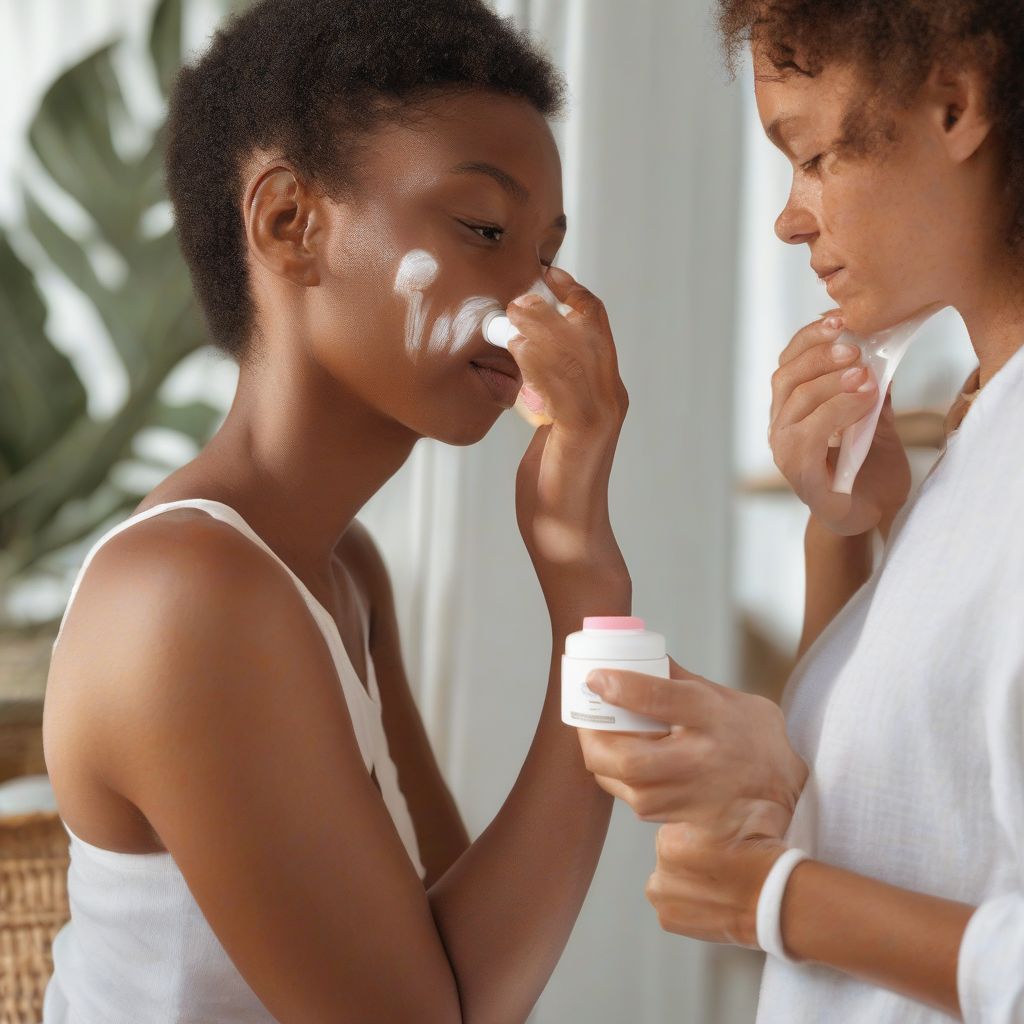Ever dreamt of waking up with that coveted “glass skin” glow, only to be greeted by a new friend on your face? We’ve all been there. Dealing with acne can be frustrating, but the good news is, a consistent skincare routine tailored to your skin’s needs can make a world of difference. As a nutritionist and meal prep coach, I know that true beauty starts from within, but a little TLC on the outside never hurts! Let’s dive into a comprehensive skincare routine for acne-prone skin, covering everything from cleansing to targeted treatments.
Understanding Acne-Prone Skin
Before we jump into the routine, let’s understand what we’re dealing with. Acne-prone skin is often characterized by:
- Excess oil production: Our skin’s oil glands (sebaceous glands) sometimes work overtime, leading to clogged pores and breakouts.
- Inflammation: Acne is essentially an inflammatory response, which is why those pesky pimples appear red and swollen.
- Bacteria: P. acnes (Propionibacterium acnes) is a bacteria that thrives in clogged pores and contributes to inflammation.
- Hormonal fluctuations: Hormones play a significant role in sebum production, explaining why breakouts are common during puberty, menstruation, or pregnancy.
Building Your Acne-Fighting Skincare Routine
A successful skincare routine for acne-prone skin focuses on gentle cleansing, exfoliation, treating acne, and protecting the skin barrier. Here’s a step-by-step guide:
1. Cleanse Gently (Morning and Night)
What to look for: A gentle, pH-balanced cleanser that effectively removes dirt, makeup, and excess oil without stripping your skin of its natural moisture.
Ingredients to love: Look for cleansers with ingredients like:
- Salicylic Acid: A beta-hydroxy acid (BHA) that penetrates pores to dissolve oil and dead skin cells.
- Glycolic Acid: An alpha-hydroxy acid (AHA) that gently exfoliates the skin’s surface.
What to avoid: Harsh sulfates and alcohol-based cleansers can irritate and dry out acne-prone skin, making breakouts worse.
Expert Tip: “Always wash your face with lukewarm water. Hot water can strip the skin of its natural oils, leading to dryness and irritation,” says Dr. Susan Bard, a board-certified dermatologist based in New York City.
2. Exfoliate (1-2 Times a Week)
What it does: Exfoliation removes dead skin cells that can clog pores and contribute to breakouts.
Types of exfoliation:
- Chemical exfoliation: Uses acids like AHAs (glycolic acid, lactic acid) and BHAs (salicylic acid) to dissolve the “glue” that holds dead skin cells together.
- Physical exfoliation: Involves using scrubs or tools to manually remove dead skin cells. However, this method can be too abrasive for acne-prone skin and is best avoided.
Expert Tip: Start with exfoliating once a week and gradually increase the frequency to twice a week if your skin tolerates it well. Always follow with sunscreen in the morning, as exfoliation can increase sun sensitivity.
3. Treat with Acne-Fighting Ingredients (Morning and/or Night)
This is where you bring in the big guns to target existing blemishes and prevent future breakouts:
Ingredients to look for:
- Benzoyl Peroxide: Kills acne-causing bacteria and helps unclog pores. Start with a low concentration (2.5%) and gradually increase as tolerated.
- Salicylic Acid: As mentioned earlier, this BHA is excellent for penetrating pores and preventing blackheads and whiteheads.
- Retinoids: Vitamin A derivatives like retinol and tretinoin are incredibly effective for reducing inflammation, unclogging pores, and speeding up cell turnover. However, they can cause dryness and irritation, so start slowly and use them only at night.
Expert Tip: “When incorporating new products into your routine, start with one at a time to assess your skin’s tolerance. Introduce a new product every two weeks to allow your skin to adjust,” advises Dr. Rachel Nazarian, a board-certified dermatologist.
4. Moisturize (Morning and Night)
Why it’s crucial: Even oily, acne-prone skin needs hydration. A well-formulated moisturizer helps maintain the skin’s protective barrier and prevents dryness and irritation, which can worsen acne.
What to look for: Oil-free, non-comedogenic (won’t clog pores) moisturizers with ingredients like hyaluronic acid (attracts and retains moisture) and ceramides (help repair and protect the skin barrier).
Expert Tip: “Look for the term ‘non-comedogenic’ on skincare products, which means they have been tested and shown not to clog pores,” says Dr. Joshua Zeichner, director of cosmetic and clinical research in dermatology at Mount Sinai Hospital.
5. Protect with Sunscreen (Every Morning)
Why it’s non-negotiable: Sun exposure can worsen acne scars and hyperpigmentation (dark spots left behind by acne). Additionally, many acne medications increase your skin’s sensitivity to the sun.
What to look for: A broad-spectrum sunscreen with an SPF of 30 or higher that’s oil-free and non-comedogenic.
Expert Tip: Apply sunscreen generously and evenly to all exposed skin, even on cloudy days. Reapply every two hours, especially after swimming or sweating.
 Sunscreen for Acne-Prone Skin
Sunscreen for Acne-Prone Skin
Additional Tips for Acne-Prone Skin
Beyond a solid skincare routine, here are some additional tips to keep those breakouts at bay:
- Don’t pick or squeeze pimples: It can worsen inflammation, increase the risk of infection, and lead to scarring.
- Change your pillowcases regularly: Pillowcases can harbor oil, bacteria, and dead skin cells, so wash them at least once or twice a week.
- Keep your makeup brushes clean: Dirty makeup brushes can transfer bacteria to your skin. Clean them regularly with a gentle cleanser.
- Manage stress: Stress can trigger hormonal fluctuations that lead to breakouts. Find healthy ways to manage stress, such as exercise, meditation, or spending time in nature.
- Eat a balanced diet: While diet alone may not cure acne, a balanced diet rich in fruits, vegetables, and whole grains can support overall skin health.
Conclusion
Achieving clear skin is a journey, not a sprint. Be patient, consistent with your routine, and don’t hesitate to consult a dermatologist if you have persistent or severe acne. Remember, everyone’s skin is different, so what works for one person may not work for another. The key is to find a routine that addresses your unique skin concerns and stick with it!
Do you have any tried-and-true skincare tips for acne-prone skin? Share your wisdom in the comments below!
[amazon bestseller=”acne treatment”]
